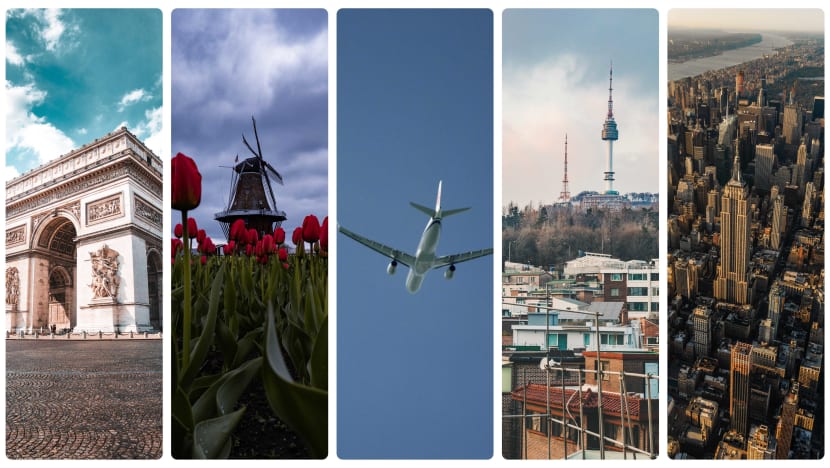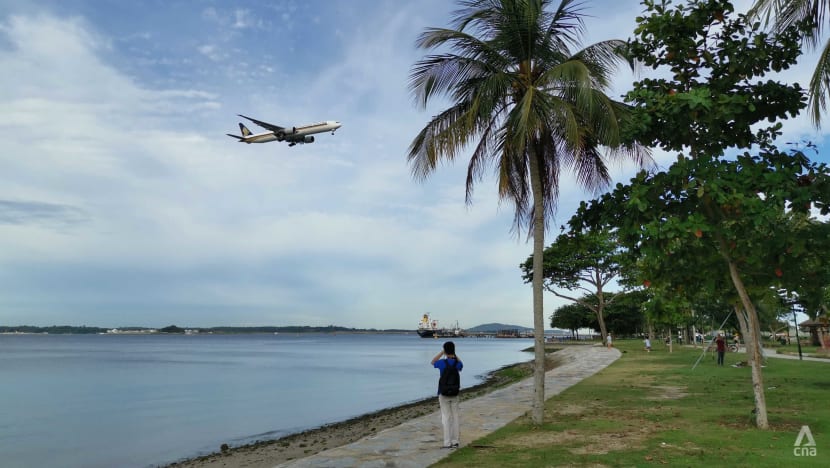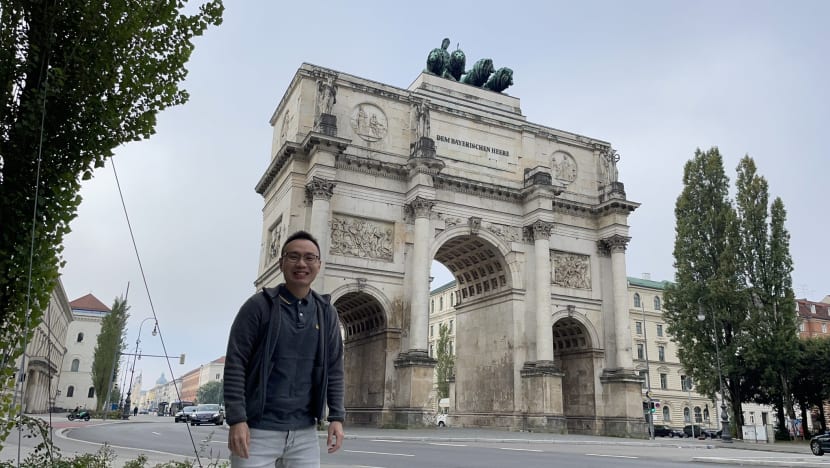IN FOCUS: Leaving on a jet plane - Will vaccinated travel lanes provide relief for travel-starved Singapore?
After 18 months of restrictions, the establishment of vaccinated travel lanes with 11 countries offers the first real chance in about 20 months for Singapore residents to go on holiday. But are the risks of travelling during a pandemic worth it?

Composite image of plane and landmarks in vaccinated travel lane destinations France, the Netherlands, South Korea and the United States.
SINGAPORE: When Singapore’s first vaccinated travel lanes with Brunei and Germany were announced in August, Tan Bao Ren recalls that he did not take the news seriously.
It seemed like a “strange idea” to be travelling for leisure in the midst of a pandemic, Mr Tan said of the scheme - which allows travellers who have received at least two jabs of a COVID-19 vaccine to enter Singapore without the need for quarantine.
“But then after I studied more on the scheme and how Germany is managing it, I got excited and booked my tickets I think the next day after the announcement,” the 31-year-old public officer told CNA.
Mr Tan was one of more than 3,100 people to travel via a vaccinated travel lane (VTL) in the first month of the initiative.
From Oct 19, Singapore will further expand its vaccinated travel lane to include eight other countries - Canada, Denmark, France, Italy, the Netherlands, Spain, the United Kingdom and the United States.
The scheme is set to expand even further, with another similar arrangement with South Korea to be introduced on Nov 15.
And earlier this week, Minister for Transport S. Iswaran said in an interview with Bloomberg Television that Singapore is keen to work with countries such as Australia, Japan and New Zealand, as well as other countries in the region, on similar travel lanes.
Those who are fully vaccinated will be able to travel into Singapore without the need to serve quarantine, needing only to take polymerase chain reaction (PCR) tests to confirm they are not COVID-19 positive.
It was later announced children under the age of 12, who are not yet eligible to receive COVID-19 vaccines, would be allowed to travel via such lanes as well.
QUARANTINE EFFECTIVELY A “TRAVEL BAN”
The initiative represents the most significant easing of Singapore’s travel restrictions since the COVID-19 pandemic began early last year.
Over the past 20 months, as part of efforts to stop the spread of COVID-19, most visitors arriving in Singapore have had to serve stay-home notices - a type of quarantine - for durations of up to three weeks, with few exceptions.
Such isolation periods have effectively served as a travel ban, said Greg Waldron, Asia managing editor for industry publication FlightGlobal.
Last year saw visitor arrivals to Singapore plummet 85.7 per cent to 2.7 million, down from 19.1 million in 2019.
Vaccinated travel lanes provide “a glimmer of light at the end of the tunnel”, said Mr Waldron, adding there is still a long way before commercial aviation returns to what it was before the pandemic.
He questioned whether it made sense to continue imposing travel restrictions and requiring quarantine periods, noting both how widespread COVID-19 cases are and how vaccination against the disease is becoming increasingly common.
During a press conference last weekend, Mr Iswaran said the introduction of the vaccinated travel lanes was a significant step in the reopening of Singapore's borders, "crucial to reclaiming and rebuilding our status as an international aviation hub with global connectivity".
Reconnecting with the 11 vaccinated travel lane countries is important, he said, noting they accounted for about 10 per cent of pre-pandemic annual passenger arrivals at Changi Airport and also ranked among Singapore's top 20 trading partners.
"We aim to restore safe two-way quarantine-free travel with more countries and regions from around the world, and are engaged in several discussions to that end," Mr Iswaran said then.

ESCAPING CLAUSTROPHOBIA
Following the long period of restrictive travel requirements, vaccinated travel lanes look to have sparked a lot of interest.
There were reports of long queues at the Singapore Airlines (SIA) service centre on Orchard Road, with the national carrier’s website crashing briefly on Saturday, less than two hours after the announcement of the new travel lanes.
And on Tuesday (Oct 12) - the first day that applications for vaccinated travel passes to the new European and North American countries were opened - more than 2,400 people were issued such passes to enter Singapore from the eight countries.
Mr Tan said his trip to Germany in September was “definitely a good break away from Singapore”, noting one of the highlights was a visit to Neuschwanstein Castle.
In fact, COVID-19 protocols made the day trip to the castle more enjoyable, he noted.
“I understand from the guide that it would have extremely packed ordinarily but now the tours into the castle were capped at twenty pax each session allowing more attention to questions and sharing by the guides,” he said.
For Mr Tan, travelling to Germany provided a glimpse at what living with COVID-19 might look like in Singapore’s future.
With measures similar to Singapore’s in terms of mask wearing and contact tracing, life has largely returned to normal in the Western European nation, he said.
“I think Germany’s COVID protocols showed us how endemic living is and how it is seen as a very normalised thing should one contract COVID, versus the stigma it now has in Singapore or in Asia broadly.”
He noted though that travelling during the pandemic required more research and planning to meet requirements such as making time to take a PCR test before flying off from Munich, as well as finding a conveniently located lab to do so.
Still, Mr Tan believes the processes were as straightforward as they could be.
The trip was “definitely worth the hassle”, he said, noting the only point where he was worried about infection was when he met friends for dinner at an indoor eatery in Berlin.
“As there was no capacity cap, as far as I understand, as long as you’re vaccinated, the outlets are free to sit the usual full house number of patrons,” he said.
As an added precaution, he used alcohol wipes to wipe down furniture in his hotel room as well as when dining in at restaurants.

However, while VTLs offer the opportunity for comparatively straightforward travel, things can go wrong.
Freelance writer He Ruiming, who was planning to travel to Germany earlier this month, had to postpone his trip when he received the results of a PCR test, revealing he was COVID-19 positive.
Though Mr He was unable to recover some of his expenses on Airbnb accommodation that he had booked, he was able to reschedule his flight on SIA at no additional cost.
“So I just told SQ (Singapore Airlines) that I have COVID so I would like to change my flight and they were very nice about the whole thing,” said the 32-year-old, who hopes to be able to travel later this month.
"It's just been lots of cancellations, but I guess the good thing is that I bought insurance early on so I'm not too worried about it," he added.
One prospective traveller, who wanted to be known only as DS, is planning to fly to Barcelona via the new arrangement, from there travelling to places in Northern Spain and Southern France.
The 29-year-old civil servant said he had already been planning the trip with a friend in the days leading up to the announcement of the travel lanes.
This was when both countries were placed in Category II of the Health Ministry’s risk assessment framework, allowing travellers entering Singapore to serve a shortened seven-day stay-home notice at their own accommodations, rather than in a dedicated facility.
DS said he plans to travel around in a campervan during his vacation, exploring the mountains and the coast.
“I think part (of the appeal) of travel has always just been that kind of freedom to explore and wander around that you can't really get, I think, in Singapore,” he said.
Being confined by travel restrictions may have left people in Singapore climbing the walls, said sociologist Tan Ern Ser.
“Like it or not, we are an island nation, all of 720 sq km,” said Dr Tan, an associate professor with the National University of Singapore’s Department of Sociology.
“We can put up with doing some local tourism for a while, but the thought of not being able to even go across to our neighbour Malaysia may have caused us to feel claustrophobic.”
People “longed to travel for leisure after staying home for over 20 months and are eager to spread their wings and fly when they are able to do so with minimal inconvenience”, said Ngee Ann Polytechnic senior tourism lecturer Michael Chiam.
Lifting travel restrictions is a sign that the situation is beginning to look up, said Dr Tan, though he suggested that relieving pandemic fatigue will depend on whether Singapore can sustain the momentum of moving towards an endemic situation.
Dr Chiam noted that other groups driving the demand for the vaccinated travel lanes are those seeking to reconnect with relatives and close friends in other countries, as well as business people who need to visit overseas operations and meet with clients, he said.
STAYING SAFE WHILE TRAVELLING
The various vaccinated travel lanes have a number of requirements aimed at preventing the spread of COVID-19.
Travellers must be fully-vaccinated - that is, travel must be at least two weeks after receiving the full regimen of Pfizer-BioNTech/Comirnaty, Moderna or other vaccines on the World Health Organisation’s (WHO) Emergency Use Listing.
Of note is that not all countries recognise non-mRNA COVID-19 vaccines such as Sinopharm and Sinovac.
Currently the Netherlands, Spain and South Korea are the only VTL lane destinations who recognise travellers who have taken these vaccines as fully-vaccinated.
Most of the destinations require a negative COVID-19 test to enter, as well as proof of their fully-vaccinated status via vaccination certificates issued in Singapore or any of the other vaccinated travel lane countries.
Given the different requirements of each country, the Immigration and Checkpoints Authority advises those travelling out of Singapore to vaccinated travel lane regions to “check the prevailing entry requirements of the destination, and to exercise care and caution, especially when travelling with children”.
To keep themselves even safer, Ngee Ann Polytechnic’s Dr Chiam said travellers should also keep abreast of local news and updates, and keep away from places where there is a high infection rate.
“It is good for them to avoid crowded places and remember to maintain good personal hygiene at all times,” he said.
Deciding whether a destination is “safe” based on factors such as relatively lower rates of infection and higher vaccination rates is definitely an important consideration, Dr Chiam added.
“Travellers should weigh their decisions to travel based on consideration such as aversion to perceived risk, health and safety concerns as well as costs involved, amongst others,” said Dynasty Travel public relations and communications director Alicia Seah.
“It is important to have a comprehensive travel insurance plan to cover trip cancellation and overseas medical expenses as a result of COVID-19,” she added.
Ms Seah said the tour agency has adopted safe distancing measures such as reducing its maximum tour group size to 20, down from 40 previously, as well as providing face masks and hand sanitisers on its coaches.
Dynasty Travel also has protocols in place to conduct COVID-19 testing on unwell travellers, as well as quarantine them if necessary, she added.
“The rest of the group will also be tested and the tour will proceed for those who tested negative,” she said.
Civil servant DS said he is not too worried about getting infected while on his trip, as he believes the countries he will be visiting - Spain and France - are relatively safe.
“For me, the idea of the trip is to campervan around and be in the mountains, where you’re not really likely to meet other people anyway,” he said.
WILL LIFTING RESTRICTIONS CAUSE CASES TO RISE?
But as travel restrictions get relaxed progressively, concerns have been raised about imported cases causing infection numbers to rise even further - perhaps through undetected COVID-19 cases slipping through the cracks or travellers using fake vaccination certificates to enter the country.
In May, it was suggested that a large cluster of coronavirus cases at Changi Airport could be traced back to an initial transmission through “an airport worker who was assisting a family from South Asia".
Associate Professor Alex Cook from the Saw Swee Hock School of Public Health at the National University of Singapore believes the move will have “very limited impact”, noting the relatively small number of infected travellers so far.
According to the Civil Aviation Authority of Singapore, only two COVID-19 cases have been picked up from the almost 2,000 travellers coming in as visitors or work-pass holders who made use of the vaccinated travel lanes with Germany and Brunei as of last week.
Both were detected by the PCR tests they took upon arrival at Changi Airport.
“Requiring vaccination is important, however, as the last thing we want is for infected travellers to come and take up scarce hospital beds,” said Assoc Prof Cook.
“The reality is that there will be some leakage from the new loosened border control measures,” said Professor Teo Yik Ying, dean of the Saw Swee Hock School of Public Health.
“But given that we are moving to treat Covid-19 as an endemic infection in Singapore, this means that the leakage is unlikely to contribute significantly to the overall infections in Singapore,” he adds.
Still, concerns about the coronavirus are an impediment to wanderlust for some.
Commercial artist Mohammed Farhan said he is apprehensive about travelling for now as his two-year-old daughter is unvaccinated and would be uncomfortable with the invasive PCR tests.
“When she is able to get vaccinated and just do ART (antigen rapid test), then we may consider,” said the 39-year-old.
Others however remain set on travelling, in spite of the pandemic.
His trip to Germany was "definitely a good break away from Singapore,” said 31-year-old Mr Tan.
"I am (going to) Canada in December to catch SQ's seasonal flight to Vancouver," he tells CNA.
BOOKMARK THIS: Our comprehensive coverage of the COVID-19 pandemic and its developments
Download our app or subscribe to our Telegram channel for the latest updates on the coronavirus pandemic: https://cna.asia/telegram




















